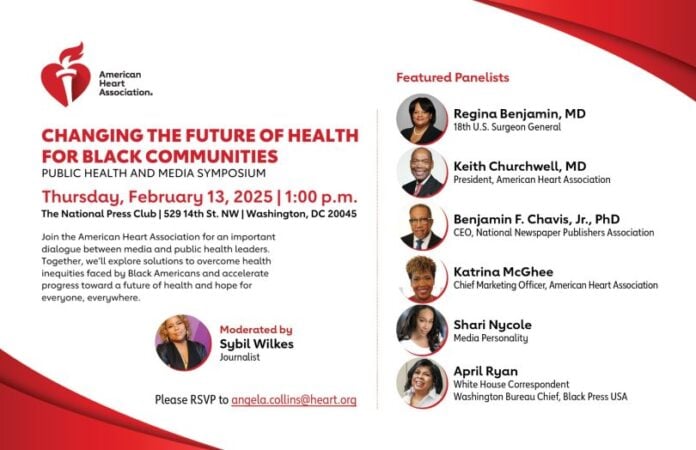
By Stacy M. Brown, NNPA Newswire Senior National Correspondent
For the first time, a major corporation has chosen to broadcast a significant health initiative exclusively through the Black Press of America. The American Heart Association (AHA) partnered with the National Newspaper Publishers Association (NNPA) to present “Changing the Future of Health for Black Communities: Public Health and Media Symposium,” a virtual event streamed live on NNPA’s YouTube channel as part of Black History Month.
The NNPA is the trade association representing the more than 200 African American-owned newspapers and media companies in the United States, commonly known as the Black Press of America.
Initially planned as a hybrid event in Washington, D.C., the symposium transitioned to a fully virtual format due to inclement weather. The event brought together leaders in healthcare and media, emphasizing the critical need for collaboration in addressing health disparities impacting Black Americans.
The panel featured distinguished health professionals, including Dr. Regina Benjamin, the 18th U.S. Surgeon General and founder of the Bayou Clinic; Dr. Keith Churchwell, president of the American Heart Association; and Katrina McGhee, AHA’s chief marketing officer. Media figures included Sharí Nycole, co-host at Reach Media; Dr. Benjamin Chavis Jr., NNPA president and CEO; and April Ryan, senior White House correspondent and Washington Bureau Chief for BlackPressUSA.com. Sybil Wilkes, the veteran journalist known for her role on The Tom Joyner Morning Show, moderated the discussion.
Black Health in Crisis
Dr. Churchwell laid out stark statistics highlighting the disproportionate impact of cardiovascular disease on Black Americans.
“Cardiovascular disease remains the leading cause of death in the Black community,” Churchwell said. “Between 2017 and 2020, nearly 59 percent of Black men and women over the age of 20 had some form of cardiovascular disease, including coronary disease, stroke, and hypertension. In 2022 alone, almost 65,000 Black men and 59,000 Black women died from cardiovascular disease.”
Hypertension remains one of the most prevalent health concerns.
“The incidence of hypertension in the general population is 47 percent, but among Black men, it’s 57 percent, and among Black women, it’s 58 percent,” Churchwell said. “That’s the leading risk factor for heart disease and stroke.”
Dr. Benjamin emphasized that addressing these health disparities requires more than just medical intervention.
“We’ve learned that to truly reduce and ultimately eliminate health disparities, we must address social determinants of health, such as poverty, education, and access to care,” Benjamin said. “Studies show that poverty and dropout rates are as important a health risk factor as smoking.”
She stressed the necessity of prevention, adding, “Quality health outcomes depend on access to the right information, tools, and technology. But it also depends on communication—our patients understanding us, and us understanding them.”
Media’s Role in Shaping Black Health Outcomes
NNPA President Dr. Chavis underscored the Black Press’ role in disseminating accurate health information and combating misinformation.
“We must recognize that Black media has the power to inform, educate, and sustain critical messaging about health,” Chavis said. “One-shot messaging doesn’t work. We must repeat these messages consistently to keep them in the consciousness of our community.”
April Ryan pointed out how urgent the matter is in Black communities.
“We are still the community with the highest number of negative health outcomes in almost every category,” Ryan said. “We need to continue this conversation beyond today. This isn’t about a news cycle—it’s about life and death.”
Sharí Nycole stressed that the media must inform and lead by example.
“We can’t just tell people what to do—we have to model it,” Nycole said. “We need to be visible examples of prioritizing our health, whether through social media, community events, or personal engagement.”
CPR: Creating a “Nation of Lifesavers”
The symposium spotlighted the AHA’s Nation of Lifesavers campaign to ensure more Black families are equipped with CPR knowledge. The initiative gained national attention following Buffalo Bills player Damar Hamlin’s on-field cardiac arrest, which immediate CPR mitigated.
“Nearly three out of four cardiac arrests that happen outside a hospital occur in the home,” McGhee said. “This means the life you save is likely someone you love. Yet Black people are the least likely to receive bystander CPR. That must change.”
Churchwell pointed to a recent AHA study revealing that while bystander CPR rates have improved nationwide, Black women are the least likely to receive immediate CPR assistance.
“This presents a massive opportunity for intervention,” Churchwell said. “More people need to be trained, and we need to break down whatever barriers are preventing Black women from receiving life-saving care when they need it most.”
A Call to Action
Chavis announced that the NNPA will make Black health a top editorial priority and extend coverage beyond Black History Month.
“We cannot afford to lose a single day without focusing on healthcare,” Chavis said. “Health is not just an issue for February. It’s an issue for all 12 months, every single year.”
Ryan asserted that it’s crucial to make health a communal effort.
“We have to hold each other accountable,” she said. “Host CPR nights with your girlfriends, bring healthcare conversations to the barbershop, get cholesterol checks at your church health fair. These small changes can save lives.”
McGhee also urged action.
“We need to move from awareness to action,” she said. “One person in every household should know CPR. If you don’t, today is the day to start. Visit heart.org/nation to learn more.”



